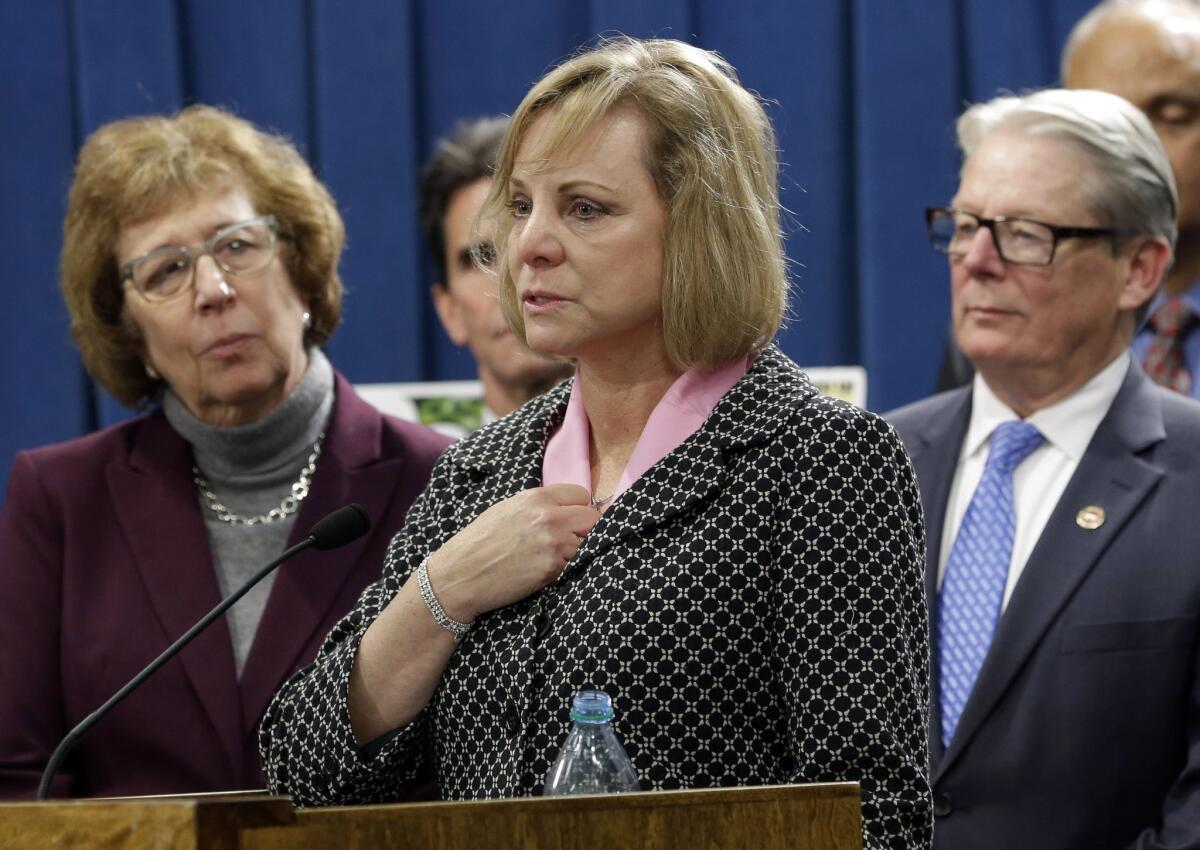California aid-in-dying bill shelved for the year

Debbie Ziegler, center, the mother of Brittany Maynard, speaks in support of proposed legislation allowing doctors to prescribe life-ending medication to terminally ill patients during a news conference at the Capitol in Sacramento on Jan. 21, 2015. A bill, authored by Sen. Lois Wolk (D-Davis), left, and Sen. Bill Monning (D-Carmel), right, that would allow California physicians to help terminally ill patients end their lives, was shelved, likely until next year, on Tuesday.
- Share via
Reporting from Sacramento — Stalled by the deep personal beliefs of many lawmakers, a proposal that would allow physicians to prescribe lethal doses of drugs to terminally ill patients in California was sidelined Tuesday.
The measure passed the state Senate last month. But on Tuesday, the authors concluded that it did not have enough support to pass the Assembly Health Committee and withdrew it from a scheduled hearing.
“We have chosen not to present SB 128, the End of Life Option Act, today in the Assembly Health Committee,” said a statement by the three authors, Assemblywoman Susan Eggman (D-Stockton) and Democratic Sens. Lois Wolk of Davis and Bill Monning of Carmel.
The measure had won the support of Health Committee Chairman Rob Bonta (D-Alameda).
“I believe that suffering patients at the end of their life should be able to choose a painless, dignified, and peaceful death,” Bonta said.
But some opposition to the bill on the committee came from their own party.
Assemblyman Freddie Rodriguez (D-Pomona) said the proposal conflicted with beliefs developed when he worked in ambulances as an emergency medical technician.
“I was there to help protect and preserve life and give folks a second chance,” said Rodriguez, a committee member. “It’s just something I couldn’t come to grips with in this bill.”
Assemblyman and committee member Jimmy Gomez (D-Echo Park) recalled growing up without health insurance and watching his father die of pancreatic cancer. He said his father might have lived longer if the disease had been detected sooner.
“I’m not comfortable voting for the bill as currently drafted,” Gomez said, adding that he told Wolk it needed to address the lack of proper healthcare for many residents.
Assemblywoman Lorena Gonzalez (D-San Diego), a committee member whose mother died from a terminal illness but lived longer than her doctors said she would, shared his concerns.
“And I’m uncomfortable with the way suicide could be viewed across society, not just [for] the terminally ill,” Gonzalez added.
The California Medical Assn. recently dropped its opposition to the bill, but other physician groups, including the Medical Oncology Assn. of Southern California, still object.
“An act that directly causes the patient’s death is contrary to the role of the physician,” the group said in a recent statement.
The Catholic Church and activists for the disabled also lobbied against the measure, arguing that those with disabilities might face coercion to end their lives early.
The legislation is modeled after a bill adopted in Oregon in 1997. But similar bills failed to advance this year in other states where they were introduced, including Connecticut, Maryland, and Nevada.
The California bill gained momentum in the Senate after Californian Brittany Maynard, 29, moved to Oregon last year so that she could end her own life rather than suffer the pain and debilitating effects of brain cancer.
The authors’ statement Tuesday said they would continue to work with Assembly members “to ensure they are comfortable with the bill.” It could theoretically be taken up in August with waivers of certain deadlines and rules, but legislative insiders said a vote this year was unlikely to succeed.
Eggman said the backers would take the bill up next year if they could not win support this year.
“I don’t think it is dead,” she said in an interview. “Legislation, like death, is a process. Things take time.”
Groups supporting the proposal have said that if it is not approved by the Legislature, there may be an initiative drive to put it on the ballot.
“We are not giving up on this legislation,” said Toni Broaddus, campaign director for Compassion & Choices, which supports the bill. “We owe it to Brittany Maynard’s family and terminally ill Californians to pursue every available remedy to give them relief from unbearable suffering.”
ALSO
California physicians end opposition to aid-in-dying bill
Palliative care expert is a vocal opponent of Death With Dignity law
Aid-in-dying bill gets support in video by woman who died last year
More to Read
Sign up for Essential California
The most important California stories and recommendations in your inbox every morning.
You may occasionally receive promotional content from the Los Angeles Times.











